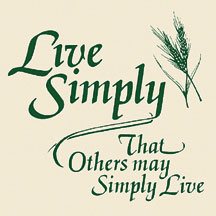
Table of Contents
What Is Simple Living Works!? | Audio/Visual
What Is Voluntary Simplicity? | Living More with Less
What We Do
A Short History of Alternatives and the Future with Photos
Plus Historical Notes on Alternatives' 20th and 30th Anniversaries by former directors Bob Kochtitzky, Milo Thornberry and Jon B. WaltersAudio/Video Stories about Alternatives by Others
What Is Simple Living Works!?
See below:Goals
Services
Guidelines
Disclaimers
Goals*
Simple Living Works! (SLW!) goals are:
1) to maintain the spirit of the five Life Standards of Living More with Less, the classic book by Doris Janzen Longacre, now re-issued in a 30th anniverary edition
2) to extend -- primarily through the internet and social media -- Alternatives' mission - "equipping people of faith to challenge consumerism, live justly and celebrate responsibly," to answer the question, "What might a Christian life look like?"
3) to offer - for free - Alternatives' 150+ educational resources: text, video and audio, all under the Creative Commons attribution, non-commercial, share-alike license.
SLW! is based on the simple proposition that voluntary simplicity is a faithful, satisfying, effective, comprehensive lifestyle. At a time when millions of Americans (and billions of humans) are living simply INvoluntarily, we hope that Simple Living Works! will serve to show that simpler living is NOT deprivation. It is such a joy to get the burden of stuff off our backs! We focus on Enough, not Growth.
Simple Living Works! does not sell anything, nor ask for money. It is a completely voluntary educational organization. Instead, we urge Alternative Giving. Give away 25% of what you spent last year on all celebrations -- Christmas, birthdays, etc. (in addition to what you normally give) -- to local, national and international causes.
SLW! does recommend some resources for sale from others. You are welcome to contact us by email - SimpleLivingWorks AT yahoo DOT com.
* Alternatives' Goals
1) "Heightening awareness in an increasingly larger audience about the implications of consumerism and commercialization in the celebrations of Christmas and other holidays."
2) "Diverting persons and institutions from over-consumption to a more just distribution and stewardship of funds and other resources."
3) "Providing a bridge between those concerned about peace, justice and sustainability of creation whether within religious institutions or outside them."
Services
SLW! offers the following free services.
1) The Archives at SimpleLivingWorks.org contain some 150 resources produced by Alternatives, 1973-2011. All of them may be used under the Creative Commons license for personal growth and educational purposes without charge or royalty. Some of the updated video resources are housed elsewhere but may be accessed from SLW.org. Visit YouTube.
SimpleLivingWorks.org >> archives is a large repository of timeless, faith-based resources promoting voluntary simpler living. The site is now maintained and up-dated regularly.
Don't be concerned about the dates on the resources. Those are for reference. They remain very much current. They are not about old 'current events.'
Hard copies of Alternatives' resources are preserved by ELCA Archives, Chicago, IL. Copies on paper, CD or DVD will be available there for a nominal charge.
2) Gerald Iversen, the past National Coordinator of Alternatives and the current administrator of the SLW! offers a free simple living coaching service for groups via internet.
3) A free monthly email newsletter, collection of 250+ podcast episodes and weekly email for Daily Nudges
4) Collaborating with Jubilee Economics Ministry, SLW! offers a weekly blog and Simpler OneEarth Living Podcast formerly The Common Good Podcast
5) For more details, click SERVICES and SOCIAL MEDIA in the menu at the top of most pages (or the links at the bottom of most pages).
Guidelines
1. This service is free. SLW! does not sell anything nor ask for donations.
2. I assume that any photocopying will be done on recycled paper because we care about Creation.
3. SimpleLivingWorks.org is a work in progress. You're welcome to email suggestions, additions, corrections.
4. A few of the resources in the Archives contain parts that are copyrighted by others. Those parts cannot be copied for distribution without permission of the original copyright holder. You can still use them for your personal, your family's and your congregation's benefit.
5. Read about Creative Commons in simple language.
Disclaimer
If you feel we have violated your copyright, notify us and we will rectify the situation. This web site is 1) largely material originally copyrighted by Alternatives, 2) in a few cases used by permission of the copyright holder, or 3) rarely published under "fair use."
A few items and pieces of art have been used for promotional purposes to benefit worthy publishers.
A few resources published by Alternatives are not here because they contain mostly material copyrighted by others. Examples include Stories and Songs of Simple Living (selections only on this site) and Sing Justice! Do Justice! (audio not on this site). Usually, when mentioned in the text (such as "Additional Resources"), the place they are available elsewhere is also mentioned.
Voluntary simpler living will spread only when self-starters share it. Here are many time-tested tools to help you.
Peace,
Gerald "Jerry" Iversen
Alternatives for Simple Living, 1973-2011
National Coordinator, 1995-2007
Founder, 2011, Simple Living Works!
805-400-0182 * SimpleLivingWorks@yahoo.com
What Is Voluntary Simplicity?
We at Simple Living Works! believe that simple living really does work! Voluntary Simplicity, choosing to live simpler lives, is a faithful, satisfying, effective, comprehensive lifestyle. It's not a list rules, nor living on the cheap. It avoids fads, convenience and deprivation. It's so much more than a hobby. We believe in abundance, that there's enough for everybody's needs, not anybody's greed. We follow the saying 'Live simply that others may simply live.'It is a balance of personal responsibility and advocacy for just public policy. It's more than just personal happiness, though that's quite important.
Living Simply and Loving It - similar AUDIO version
"Simple living today is joyful, bright, poetic and mentally robust."
from Michael Phillips and Catherine Campbell's Simple Living Investments
Voluntary Simplicity is not a list of rules. It is a consciousness, an awareness.It is a matter of personal responsibility. Every time we go to buy something, to use something, we think:
- Do I need to buy this?
- Or do I want to?
- Do I really need to use this?
- Do I buy what I like?
- What will impress?
It can be difficult separating needs from wants. Especially with some things, like automobiles. What do we use them for? Can we do without? If not, how do we choose the one we need?
Voluntary Simplicity is not a list of rules to follow, though there are five life principles. It's about seeing our lives as extravagant, even out-of-control concerning our consumption. Then deciding what to do little by little, day-by-day, week-by-week to cut down on consumption.
We recommend not going cold turkey.
That brings significant frustration.
Remember what our children would say to us when they wanted to do something that they knew was irresponsible.
- "But, all the kids are doing it."
- "But, everybody's driving a new car. . . .
- But, everybody builds a big, expensive house that's ten times bigger than they need, claiming it's for equity when the kids leave home. . .
- But, everybody has a yard that looks like a golf course so that nobody complains that we're lowering their property values. . . ."
Sounds pretty silly and disconcerting, doesn't it?
Living more simply can be lonely.
Our families, our church, our social circle may think we're peculiar. It's important to find another Simple Liver or to start a support group. It may mean dealing with resentment when others don't "get it." When we are making corrections, living more responsibly and others don't seem to have the slightest inclination to change their wasteful ways. Living Simply faces great challenges, powerful forces.Voluntary Simplicity is not romanticizing poverty, monks, the Amish or people who struggled through the Depression. We only diminish those people's devotion or struggle, and we tend to try to make the journey of discipleship look silly or "for others/unrelated to us," untouchable. Poverty is NOT fun. Two thirds of the world population live in poverty Involuntarily. We have a choice.
I don't want to sell everything and join a commune! I do.
Voluntary Simplicity is not "living on the cheap." It's more than frugality, far from being a tightwad, and surely not being a miser. In some cases we'll actually need to pay more for tools that are Earth-friendly.
Instead it's a journey to find more meaning, more joy, more fun in life by getting out from under the burden of so much stuff, to remove the barrier of stuff that keeps us apart from other people, from God and even from ourselves.
There are multiple paths to Voluntary Simplicity.
One is the secular, which is called "Downshifting." A young executive is cruising along in high gear, peddling her sports car as fast as she can. She thinks, This is a lot of work! So she downshifts, maybe she takes a different job that has a smaller income but less stress. Maybe she moves into a smaller house in a rural area and grows her own tomatoes. Maybe she gets smart, gets control of her credit card and pays off her debts. Basically she's downshifting to increase her personal happiness.
Christians adopt Voluntary Simplicity for the same reasons. Personal happiness is good. But there's more. We adopt Voluntary Simplicity also to be in touch with God and to help others. Voluntary Simplicity is a lifestyle of integrity, living as a disciple of Jesus, walking our talk.
The essence of voluntary simplicity is summarized in Living More with Less:

Similar podcast version, episodes 44-45 // SLW! Podcast, episode 2 (Getting Acquainted)
| Do Justice | 1. Do
Justice ... "Do Justice" may remind us of
the courts. . . to get our due. Biblical Justice is quite different.
It reflects God's great love for the poor and our call to respond
to their needs.
In How Much Is Enough? Alan Durning categorizes the world population into three groups. One fifth - 20% - are the disenfranchised people. They have no reliable source of food or water, no medical care, only one set of clothes and they walk wherever they go. Three fifths - 60% of the world population - are the sustainers. They have basic, reliable sources of food, some medical care, several sets of clothes and they take public transportation. The remaining fifth or 20% are the overconsumers. This group has access to lavish, cheap food, has reliable medical care, has many sets of clothes and they use private transportation. This last group, the over consumers, is made up, to one degree or another, of virtually everybody in North America, Western Europe and Japan. Guess what percentage of the world's resources are used by the disenfranchised and the sustainers, 80% of the world's population and by the over consumers, 20% of the world's population. That's right, just flip the figures. The overconsumers use 80% of the world's resources and the other 80% of the world's people use only 20% of the resources. Notice that the first principle is not "thinking about Justice," or even "believe in Justice." It's Do Justice. In addition to our prayers, our contributions, and our pressuring of governments, we help the poor around the world by taking seriously the phrase, Live Simply That Others May Simply Live. By consuming less we make more available for others. As we work to take control of our own lives, our own consumption, our own waste, we work toward changing the inequitable distribution of wealth. As we share ideas of simpler living with others we hasten the day when Justice is done. |
| Learn from the World Community | 2. Learn from
the World Community ... We have a great deal to learn
from people in countries in the developing world. Most of the world's people
live simply by necessity, not by choice.
Our attitude has largely been that we want to help those poor people with THEIR problem OVER THERE. We need to realize that their problem is caused by OUR problem OVER HERE, our problem of over consumption. All things are connected. One beautiful way to Learn from the World Community is through music. Several years ago a black bishop from Africa told an unforgettable story. He said, "White folks. . . yes, they're the people who can sing and NOT move at the same time." African music can help liberate many white North American Christians from their rigidity. Thousands of Christians are leaving North American and Western European churches. They' not going to another church. They're falling away from the faith. But in Africa, Christianity is gaining three times as many converts. We have something profound to learn from our African brothers and sisters. We can also learn about food. . . from creating simple, tasty meals to understanding the whole process from seed to table. The United States is undergoing something called "vertical integration." This is the process in which the most powerful resource - food - becomes monopolized. The people who sell the food also own or control the distribution system, and the processing plants and the production, the farms. When we shop at Farmers Markets, support community based agriculture, refuse to buy out-of-season fruits and vegetables, we begin to control and take responsibility for our food. We can learn food justice from the world community. We can learn more about community by doing menu planning and meal preparation and clean-up together. And we can vow that we will eat at least one meal a day together. So much of the time we have allowed the school, the community, the TV, even the church to take away our common meal. Research indicates that a typical U. S. father has only three minutes a day of direct conversation with his child. And that married couples in the USA have only five minutes a day of meaningful verbal exchange. Learning from the World Community about food is important for another reason. We Americans now eat a great deal of expensive, highly processed food with many of its nutrients processed out. Why? Yes, it's convenient. It's a cycle. We work more hours so we can afford more expensive food that's fast so that we can work more to buy more expensive, hollow food.... Alternatives promotes cookbooks that use recipes from Third World countries, such as More-with-Less Cookbook and Extending the Table. Even people from our highly technological medical establishment are now seeing the potential of learning from shamans, healers and witch doctors. We are learning natural and alternative cures, from the rain forests, Native Americans, herbalists, acupuncturists. |
| Nurture People | 3. Nurture People ...
We find meaning in life through our relationships with God and with
people, not through stuff. If we let them, the things we own would
own us. First we may go into debt paying for this thing shortly after
its exciting glimmer dies down. Then we have to maintain it. And
secure it so nobody steals it! What owns whom?
We put ourselves at risk by going into a mall. We find the thing that is going to give excitement and fulfillment to our life. We whip out our credit card and take our treasure home. It's great [hug the TV]. . . for a while. Then something else comes along that we can't live without. So what happens to our first little lifesaver? We either chuck it or store it. If we keep it, we have to dust it or put batteries in it. We have to maintain it. And we surely wouldn't want anyone to steal it. So we secure it. We protect it. We lock it up. So we go into debt to buy it, then we use our time and energy to maintain and secure it. It raises the question, "Who owns whom?" Yes, it gives a new meaning to the concept of ownership. I'll tell you what works for me. I play a game with myself that you can play with your children or grandchildren. It's OK to admire things in stores and say, "I Like that." It's not OK to say, "I want that," or even worse, "I need that." Think of the mall as a museum. Everything there is on display for your pleasure, but somebody else owns it. Say to yourself as you stroll through the galleries, "Thank you store person for putting this here for me to see. I'm so glad you're responsible for all this stuff and I'M NOT." Nurture People, not things. Let's use our time, money and energy to nurture relationships. . . with our self, with others and with God. We have been hearing a lot lately about intimacy, about getting to know someone well, about opening oneself up. Most of us have experienced that when we choose to be intimate with our spouse, that things get in the way. To be intimate we may choose to take something off. . . to take everything off. Stuff can get in the way of intimacy in other situations as well. We can learn to discard stuff and put relationships first. |
| Cherish the Natural Order | 4. Cherish the
Natural Order ... This is the environmental component.
Most folks have heard the four R's of Caring for Creation - reduce,
reuse, recycle and restore.
Reusing means to use something over again. It means not using something just one time. It means refusing consumables like styrofoam cups. And it also means using things that can be repaired. That's not easy because so many thing are designed to break. It's called "planned obsolescence." We can buy tools and appliances and shoes that can be repaired but we need to do our homework to find them. It's inconvenient. The Europeans are on to something. They are beginning to require manufacturers to be responsible for the final disposition of their product. That should make them a lot more concerned about how the product is built and how it can be repaired and recycled. Recycling means making something new out of something that's already been used. Most of us realize that we have to do something. So, we recycle glass, paper and metal. After glugging down a soda we drop the can in the bin and carry the bin to the curb on recycle day and feel proud to be an American, proud that we have done our best for Mother Nature. That's an important start. But that's really the easiest and least necessary part of the whole cycle. Don't use recycling as an excuse to keep things the way they are. It's not OK to keep on over-consuming just because we recycle. Even more important is Pre-cycling - evaluating a product before you buy it to make sure it is environmentally sound. And recycling does little good if we don't Close the loop. . . buy products made of recycled materials, such as paper. It does little good to recycle if we don't then buy the products we need made from recycled materials. Yes, it may for the time being cost a bit more to buy and use recycled paper. But living simply, living faithfully is not living "on the cheap." Sometimes it costs more to do what's right. Restoring. . . remember what your grandmother used to say, "You got it out. You put it back!" The most common example is trees. But this also relates to sustainable agriculture, i.e. putting natural, not synthetic nutrients back in the soil. This can help make up for past mistakes but never should be used as a reason to make future ones. And some resources cannot be restored, like oil and topsoil. The first R is the most important. . . and hardest for Americans. . . Reduce. That's what Simple Living is about. |
Nonconform Freely |
5. Nonconform Freely
... We are not talking anarchy here. We are resisting
the pressures created primarily by advertising.
The forces against us living more simply are extremely powerful and devious. Some of them are quiet, unwritten. . . like how we dress in church, how our house will look at Christmas time. But many of them are loud, in-your-face forces that work to get as deeply into your pocketbook as possible everyday. We all have basic physical needs. . . for food, for shelter, for community. It's helpful to have information about where we can meet those needs. That's one reason for advertising. What's objectionable is advertising that creates false needs, really wants or desires. . .when advertisers play with our heads, trying to get us to think that we will be better people by the beverage we drink, that we will be sexier if we buy a certain kind of car, that we will be more popular or successful if we wear certain kinds of clothes or perfume. When I watching TV, I ZAP the commercials. . . mute the sound. Be put-off by aggressive car and soda pop commercials. Are they the price of admission? That's exactly what the advertisers want you to think. But the air waves belong to the people. We owe advertisers nothing! (Remember Turn Off TV Week in April, and Buy Nothing Day, Friday, November 29. Yes, that's the day after Thanksgiving!) Sioux City is a nice place to raise a family. This past summer had billboard selling sun tan lotion that showed three young, attractive people. They happened to be naked. It was no big deal. There was no outcry. Just another billboard selling something. At the same time a group in Des Moines was working to promote breast feeding. They were turned down from buying billboard space because their subject was TOO OFFENSIVE! Some advertisers are trying to capitalize on peoples' desire for simpler lives. Recent commercials use the Simplicity theme. An expensive luxury car is hyped with a picture of the Honda Accura and the word "Simplify." Denny's restaurants use the slogan "Simplify your life. Eat out more." MBNA America, a huge credit card processor, proclaims"Simplify your life in the New Year! . . . Consolidate your holiday bills. . . ." A typical MBNA account charges over 17% interest. Credit card "checks" (a form of the dreaded cash advance) have no grace period. Interest begins accruing immediately. At the same time, their late payment fee went from $10 to $20! The Masters of Double Speak! In the name of "research," some advertisers - without your permission, even without your knowledge - place cameras in grocery stores to photograph your eyes as you shop. When you are looking at cereal, for example, the cameras record your reaction to various boxes and even count the length of time you focus on each box. This "research" helps advertisers to decide what appeals to you. We have permission to follow our religious principles, our faith, instead of our culture, instead of advertisers who pressure us to buy things we don't need, probably don't even want, and that break down on schedule. Nonconform Freely. |
WHAT WE DO
In 1973 Alternatives was founded as an autonomous institution where new interpretations of celebrations, lifestyle, culture, scripture, ecology and justice could materialize that were counter to those of the prevailing authority.
What gives Alternatives its uniqueness is its focus on celebrations, a focus which is a prism through which to view the consumer culture as well as a means of resisting it.
Alternatives acts as "the gadfly of the state." Because the organization is relatively insignificant in comparison to, say, the "U. S. economy," it can act as a small but irritating buzz in the ear of the mainstream. By pointing out the ironies in some of our culture's habits of celebrating, it can tap the discontentment that many people feel with Christmas, for example, and make sense of it. Irony is an important word, because irony involves recognition. The individual coerced into a miserable Christmas season by the pressure to consume may not realize what is going on until someone [read Alternatives] points out the irony. Of course, there are many ironies in our culture besides the compulsively consumptive celebration of Christmas, but Christmas is the tip of the iceberg.
Alternatives appeals to people who have already thought about many of the ironies involved in our way of living and celebrating but who have had little support from their immediate environment. Alternatives offers support through resources that will further reflection and action on key issues, through a support network and a speakers bureau, through this Web Site and through the assurance that other people are asking questions, too.
Since being reconsitituted in 2012 and beginning collaboration with Jubilee Economics, Simple Living Works! has become much in tune with social media, providing videos on YouTube, blogging and podcasting regularly.
A Short History of Alternatives
Table of Contents
Many more photos available through ELCA Archives.
Many more Historical Documents
Chronology/Timeline
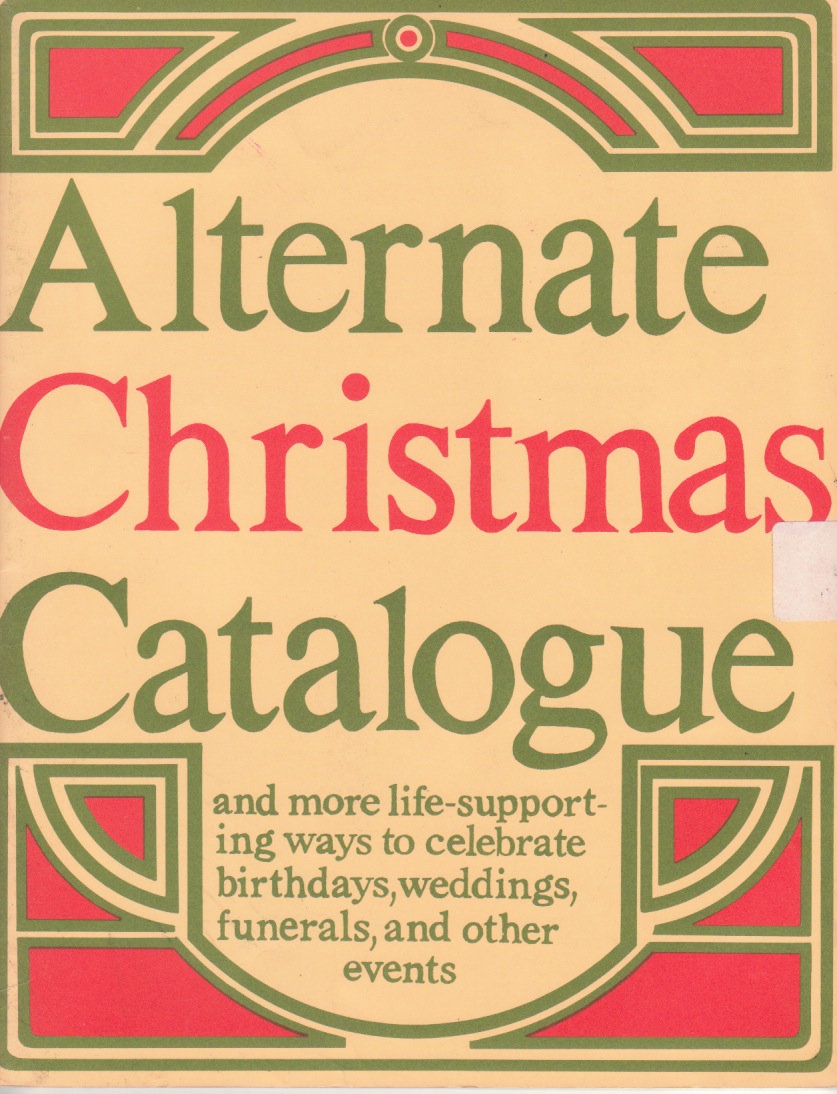
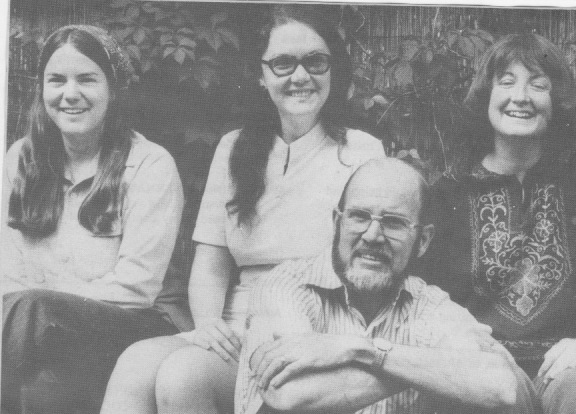
- Alternatives is founded by Bob Kochtitsky in the spring of 1973 in Jackson, Mississippi
- Bob Kochtitsky and Alternatives move to Washington, DC
- Alternative Christmas Catalogue (1st Edition) released in October
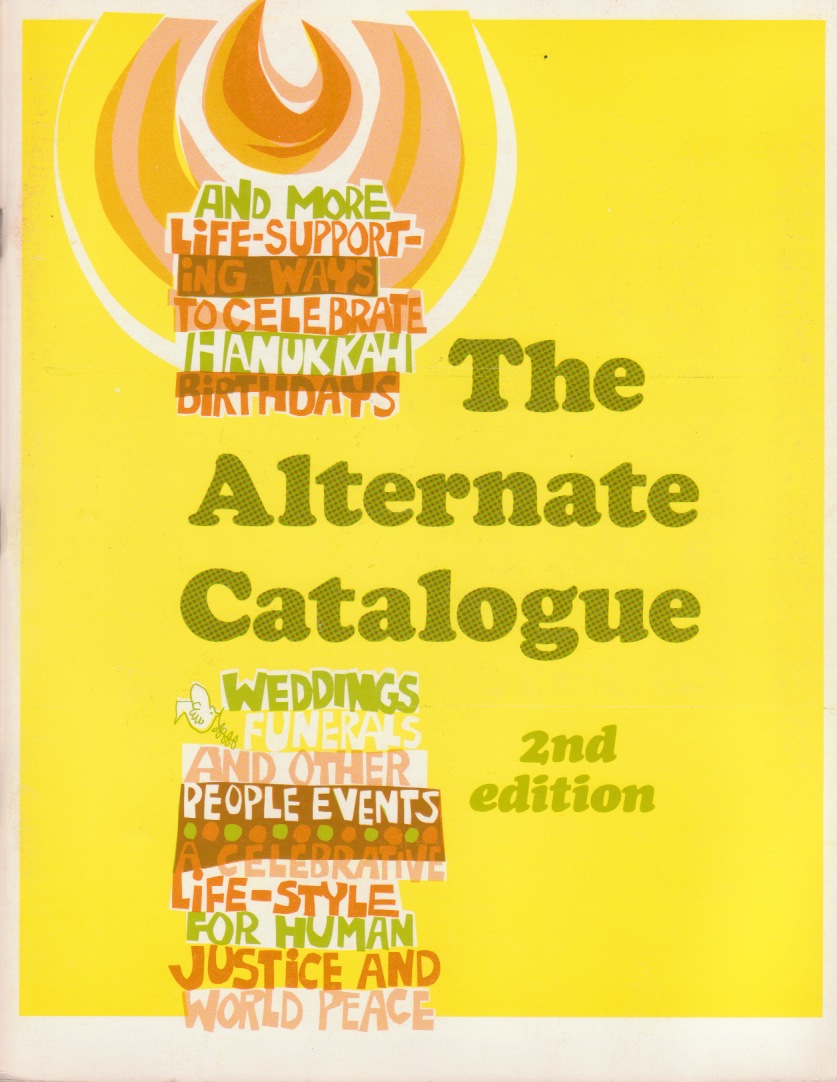
- The Alternate Catalogue (2nd Edition) released; over 46,000 copies sold
- Alternatives moves from Washington, DC, to Greensboro, North Carolina
- The Alternate Celebrations Catalogue (3rd Edition) is released
- The first issue of Alternatives Newsletter is published
- Clusters: Lifestyle Alternatives for Families and Single People published
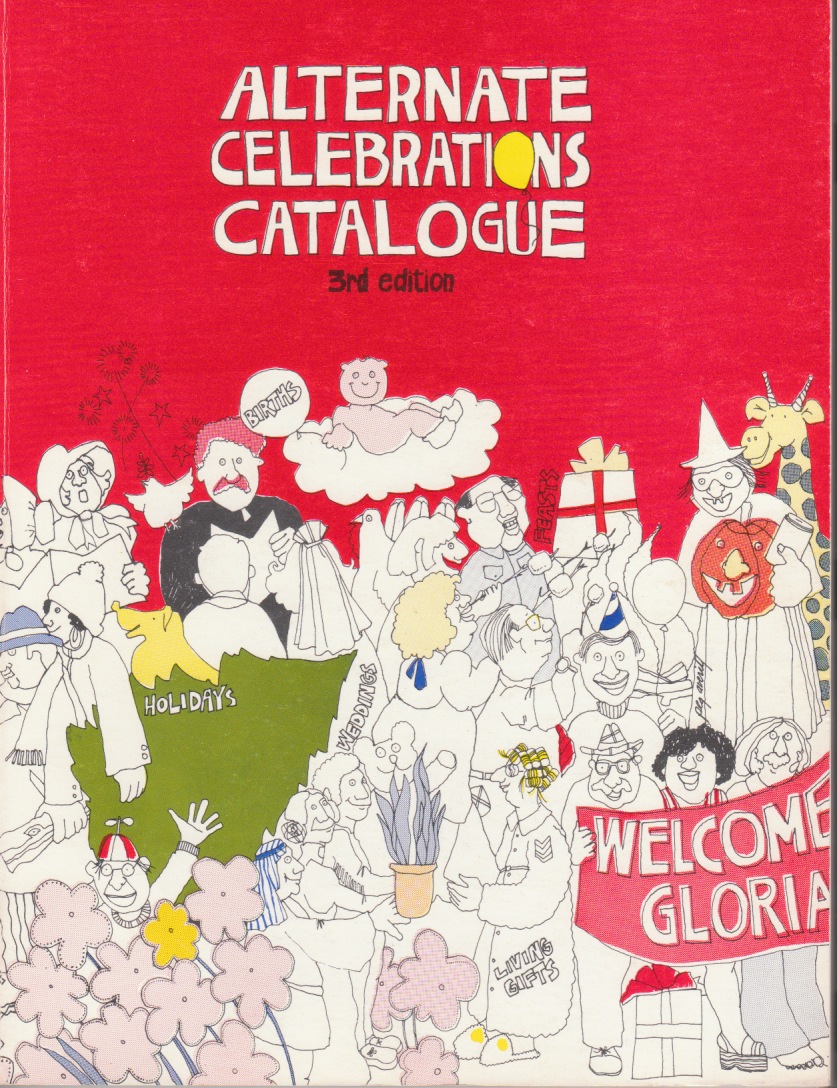
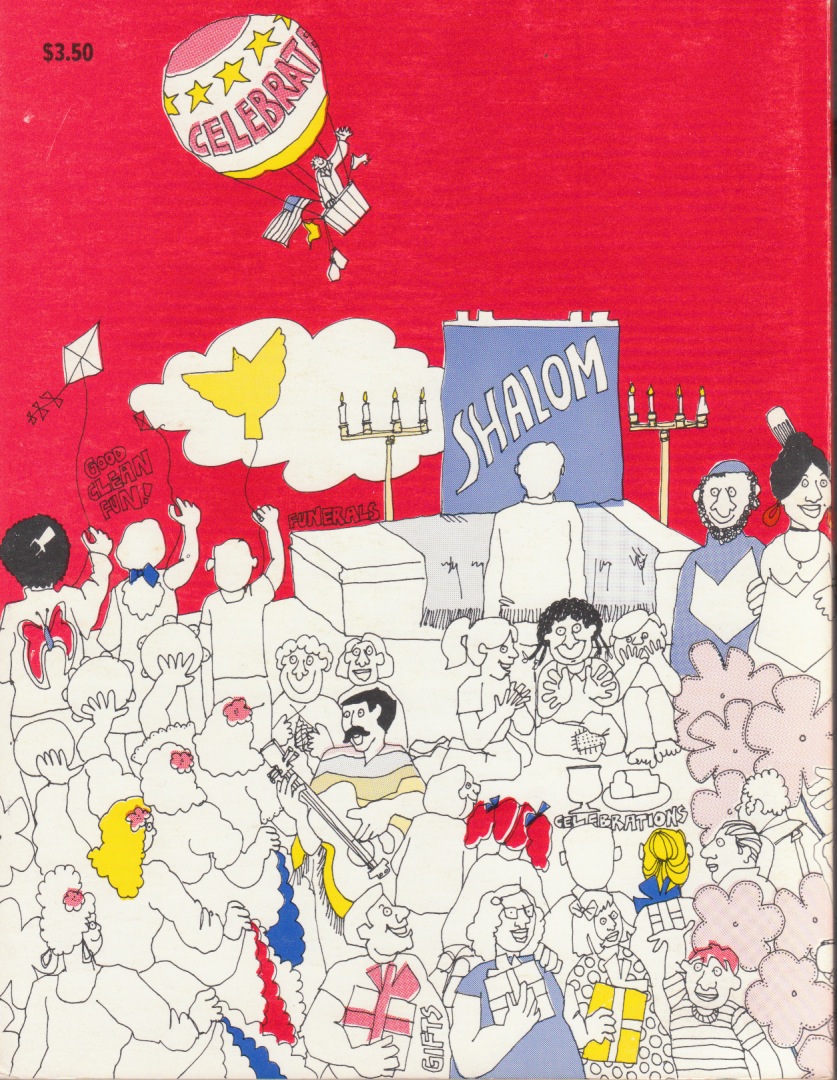
- Alternatives moves to Bloomington, Indiana, in June
- Bob and Janet Gustafson are made co-directors in September
- Alternatives begins a National Alternative Celebrations Campaign from Jackson, Mississippi
- Alternatives' Resource Center remains in Bloomington and publishes the newsletter and distributes books and other resources
- Alternative Celebrations Catalogue (4th Edition) is released
- Voluntary Simplicity Study-Action Guide is published and sells 6,500
- The Celebration Revolution of Alexander Scrooge filmstrip is released in September
- Alternatives' Resource Center moves from Bloomington to Ellenwood, Georgia
- First "Best and Worst Christmas Gift" Contest is held
- First Alternative Celebrations Calendar is published
- Milo Thornberry becomes director
- The Christmas Campaign for Congregations begins with the the creation of the first Christmas Packet, Whose Birthday Is It, Anyway?
- Alternatives moves to Forest Park, Georgia
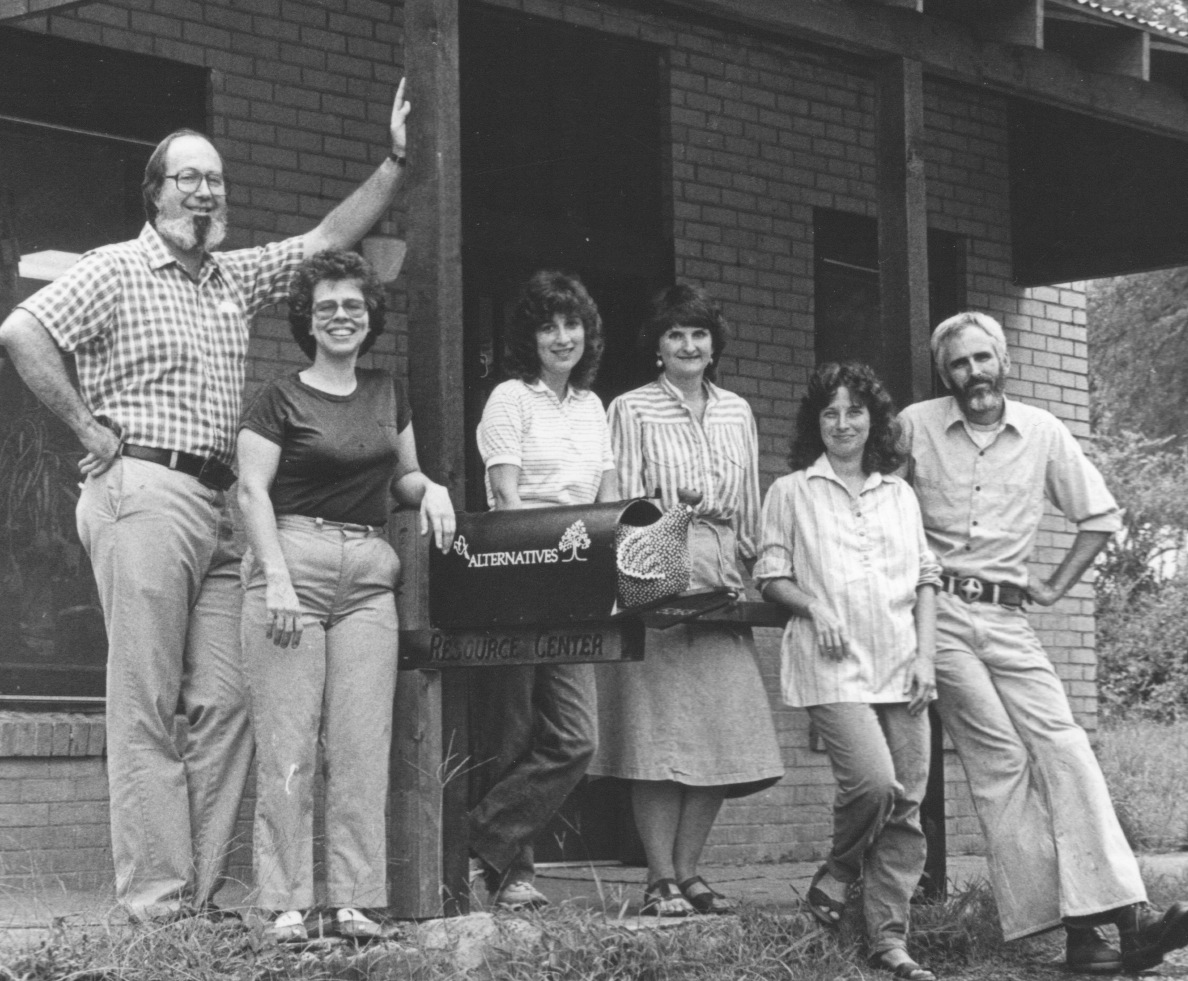 Milo Thornberry (left) and staff
Milo Thornberry (left) and staff
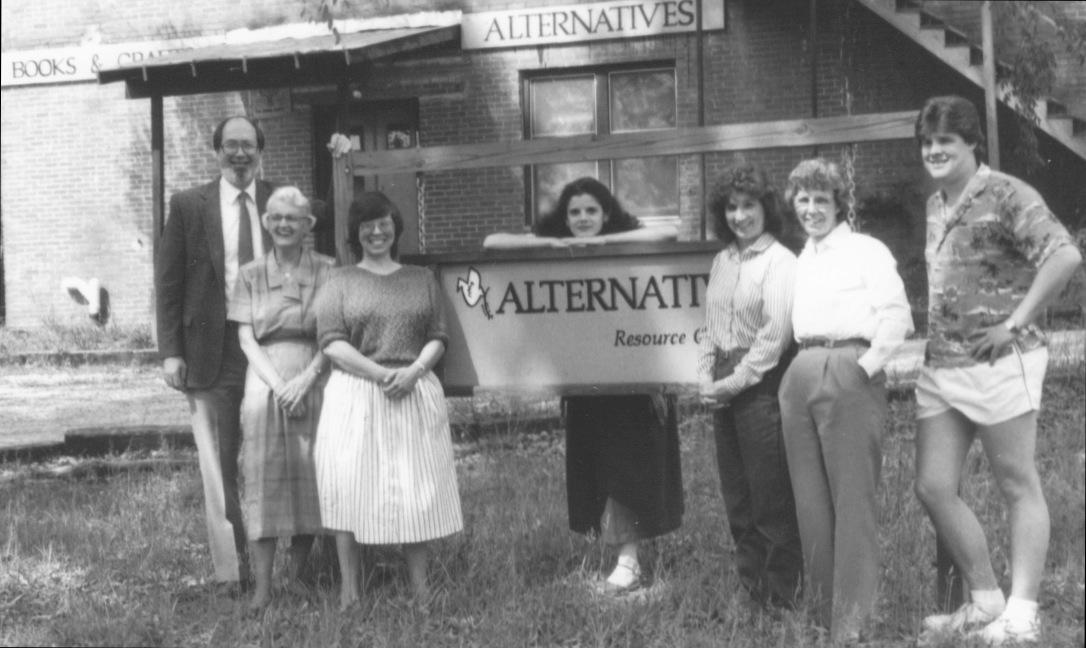
- Second Christmas Packet is produced with a mix of resources
- Alternate Celebrations Catalogue (5th Edition), is released
- First Book Service Catalogue mailed
- A series of Bulletin Inserts for holidays and special occasions is produced
- Alternatives buys an old general store and moves to Ellenwood, Georgia
- Simply Delicious: Quantity Cooking for Churches is published
- First Easter Packet published for Lent/Easter 1984
- Those Who Speak for God is published
- Guide to World Hunger Organizations is published with Seeds Magazine
- Have Yourself a Merry Little Christmas filmstrip is released
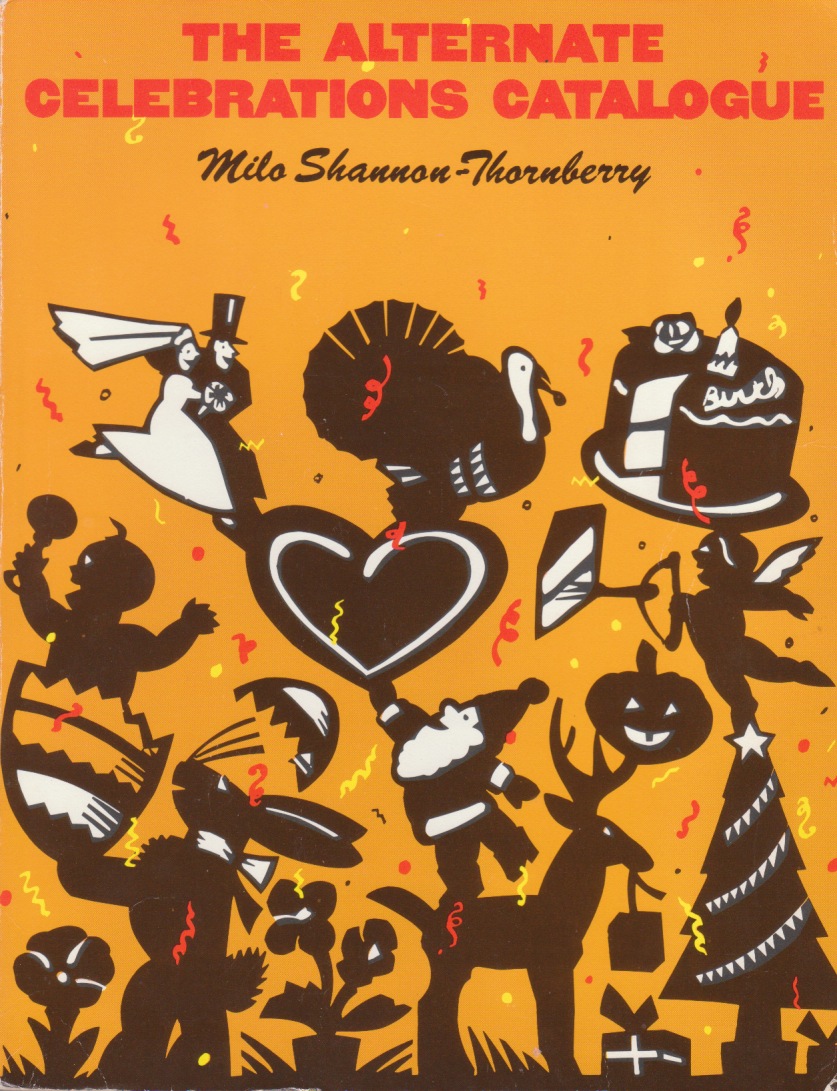
- Two Christmas Packets produced
- Shalom Connections published
- Membership program initiated
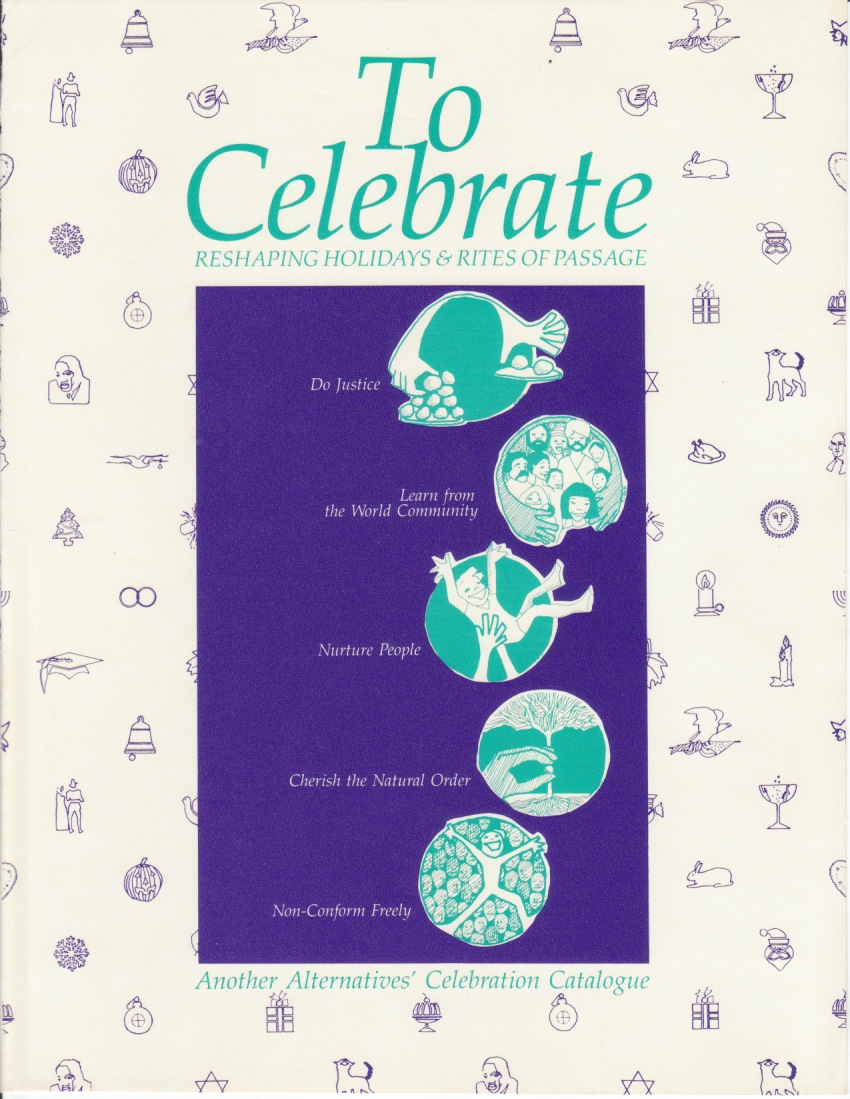
- To Celebrate: Reshaping Holidays and Rites of Passage (6th Edition Catalogue) published
- First Whose Birthday Is It, Anyway? booklet produced for households with nine denominations participating
- Milo Thornberry steps down as director
- Christmas booklet published with 16 agencies participating
- Earl Smith serves as interim director
- Kathryn Munnell made director in September
- Christmas booklet published with 20 agencies participating
- Christmas booklet produced with 23 agencies participating
- Staff management system is adopted in June
- Wedding Alternatives released in summer
- Christmas Sampler is published
- Christmas booklet produced with 23 agencies participating
- Celebrate 20th Anniversary!
- The long-awaited Break Forth into Joy! video is released
- Nuestra Boda, Spanish-language version of Wedding Alternatives, is released
- Gerald Iversen named National Coordinator; Alternatives moves to Sioux City, Iowa; name changed to Alternatives for Simple Living
- Local volunteer network established
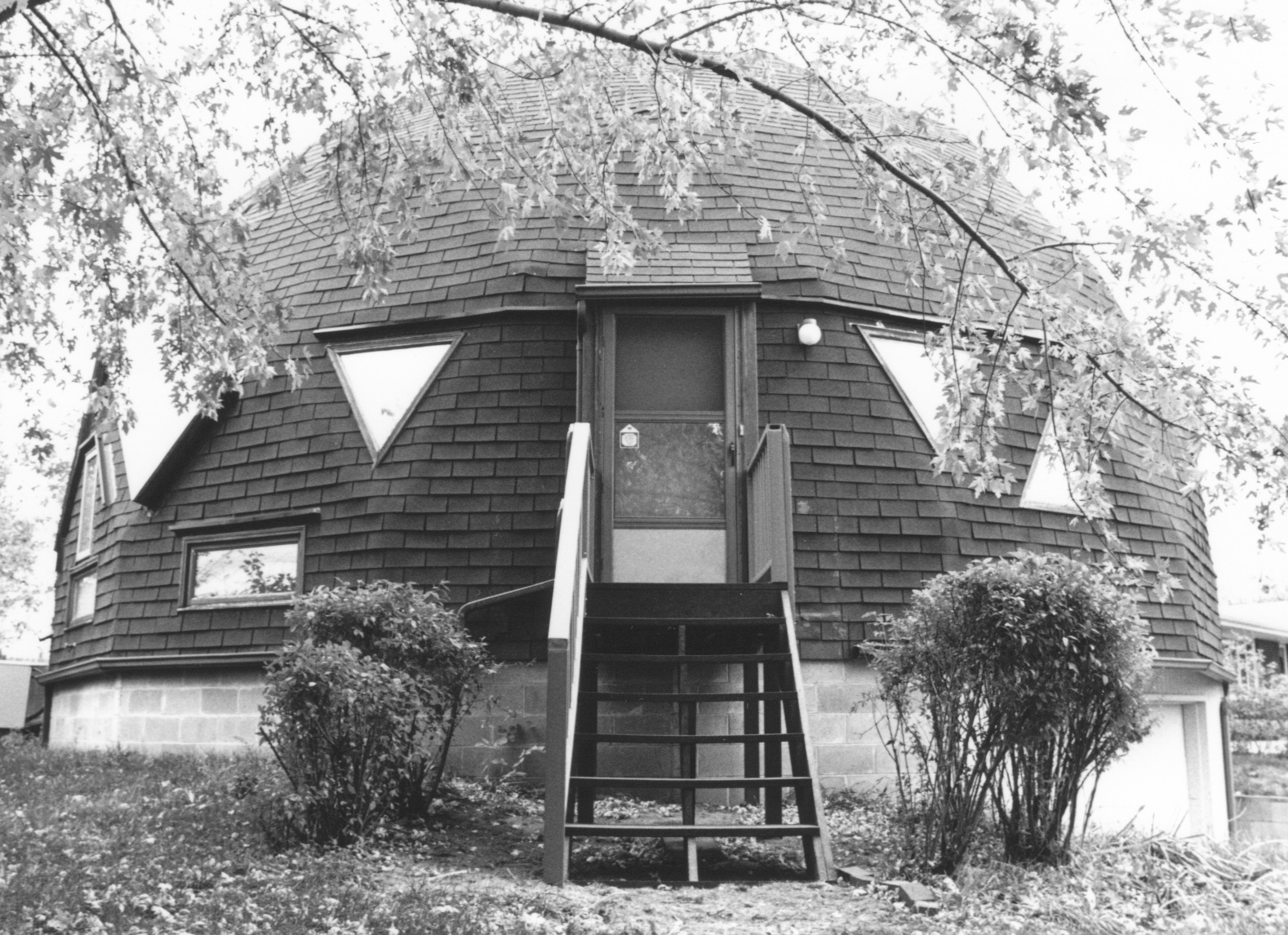
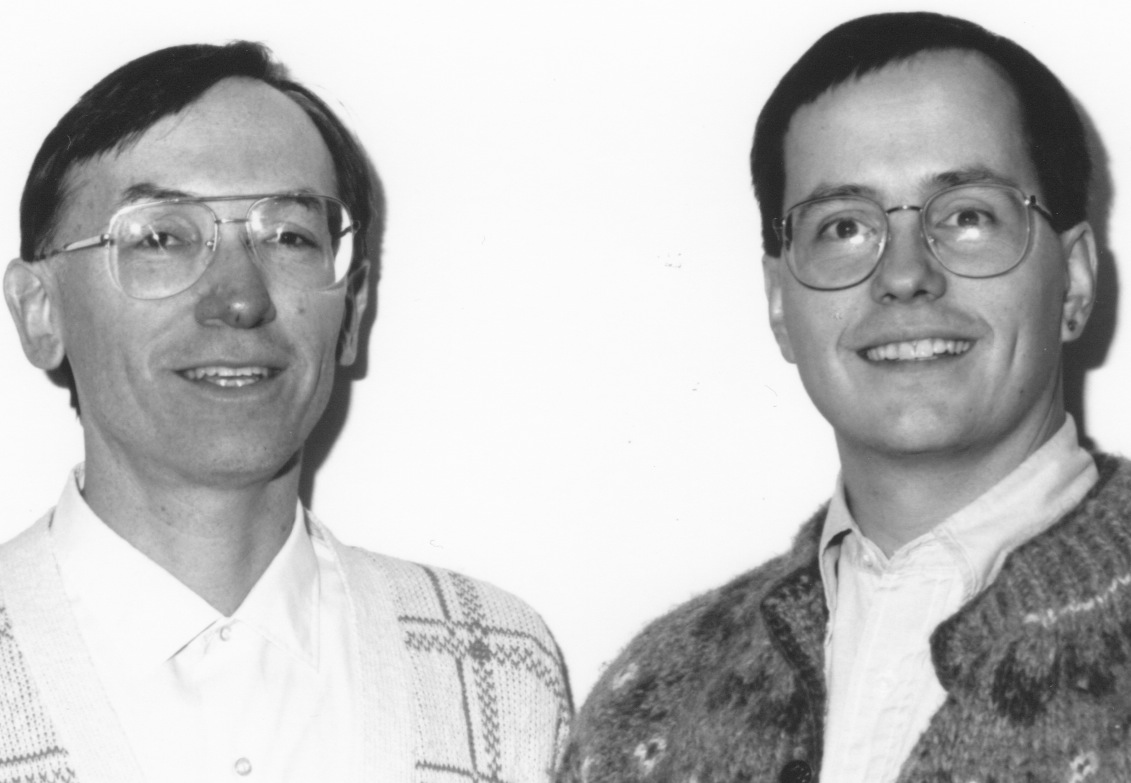
- Bilingual Lenten and Advent/Christmas Calendars issued
- The Alternative Wedding Book and Treasury of Celebrations released
- Extensive speaking engagements started by staff and volunteers
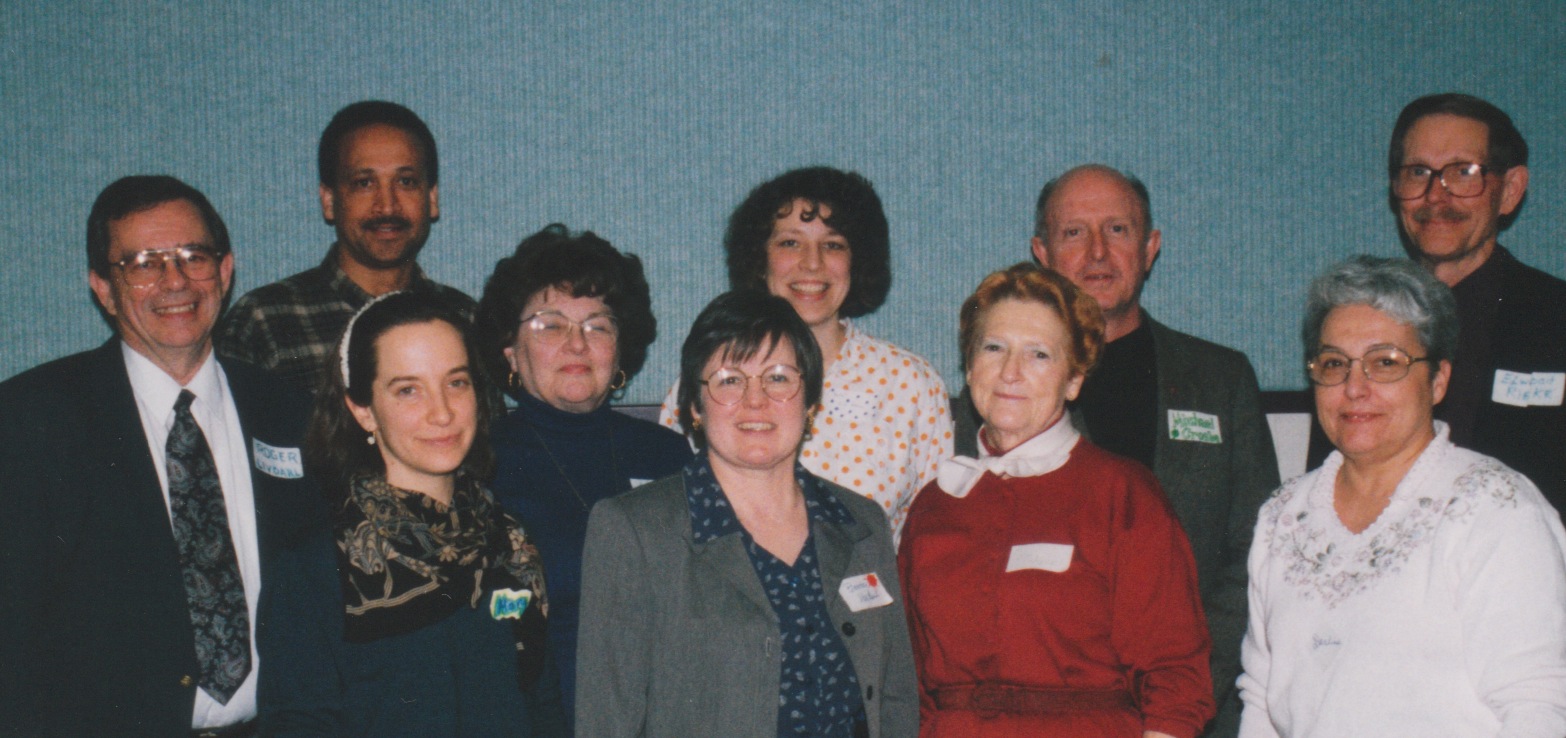
- Adviento, a annual Spanish edition of Whose Birthday? issued with CEDEPCA in Guatemala
- Simplify & Celebrate released
- Stories & Songs of Simple Living book and cassette published
- The Leaders Guide to Unplug the Christmas Machine Workshop released
- The Simpler Living Alternatives Calendar for Any Year released
- Alternatives establishes its own web site SimpleLiving.org
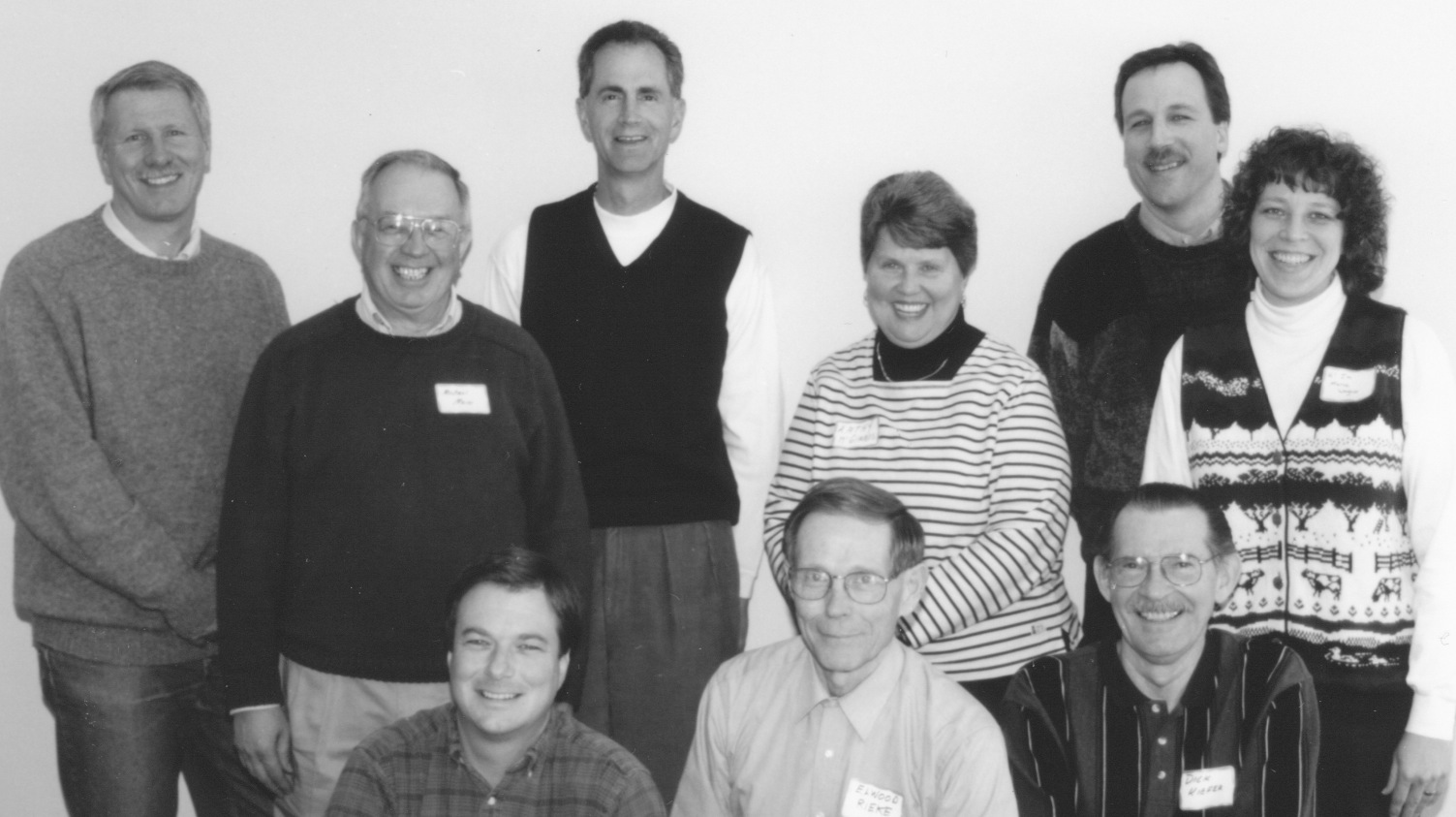
- Celebrate 25th Anniversary with events in Sioux City and Atlanta
- The SLOW Down network, a national speakers bureau of volunteers, launched
- ASSIST, Alternative's Support Service for Simpler Living, launched
- Sing Justice! Do Justice! hymn collection issued with the Hymn Society in the U.S. and Canada after Alternatives conducts international hymn contest
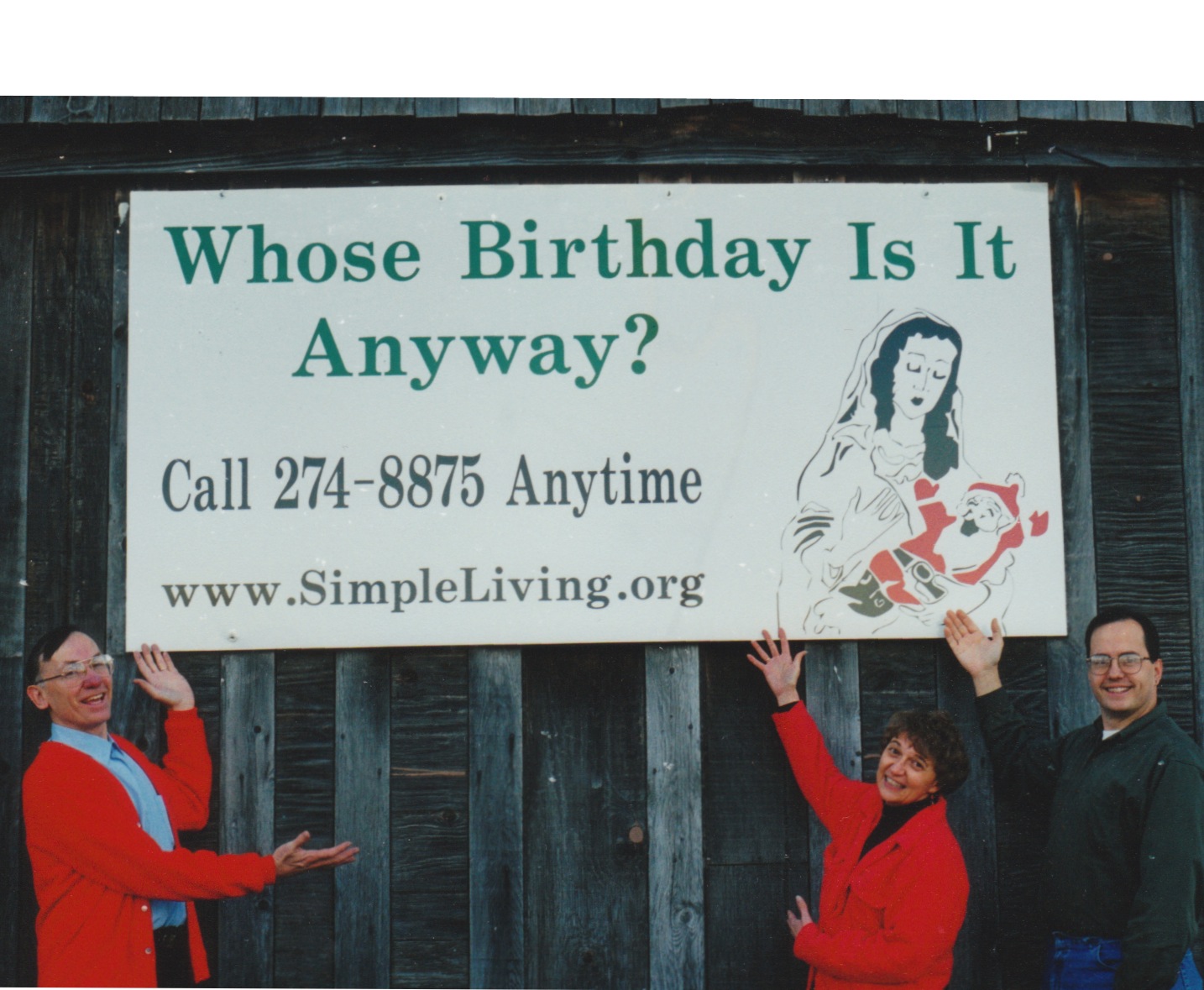
- Living More with Less Study/Action Guide released
- Who's Risen from the Dead, Anyway? released (reissue of Lent/Easter materials)
- Email newsletter started
- Stories & Songs of Simple Living released on CD
- Simple Living 101: Toolbook for Activists released
- Archives launched on web site
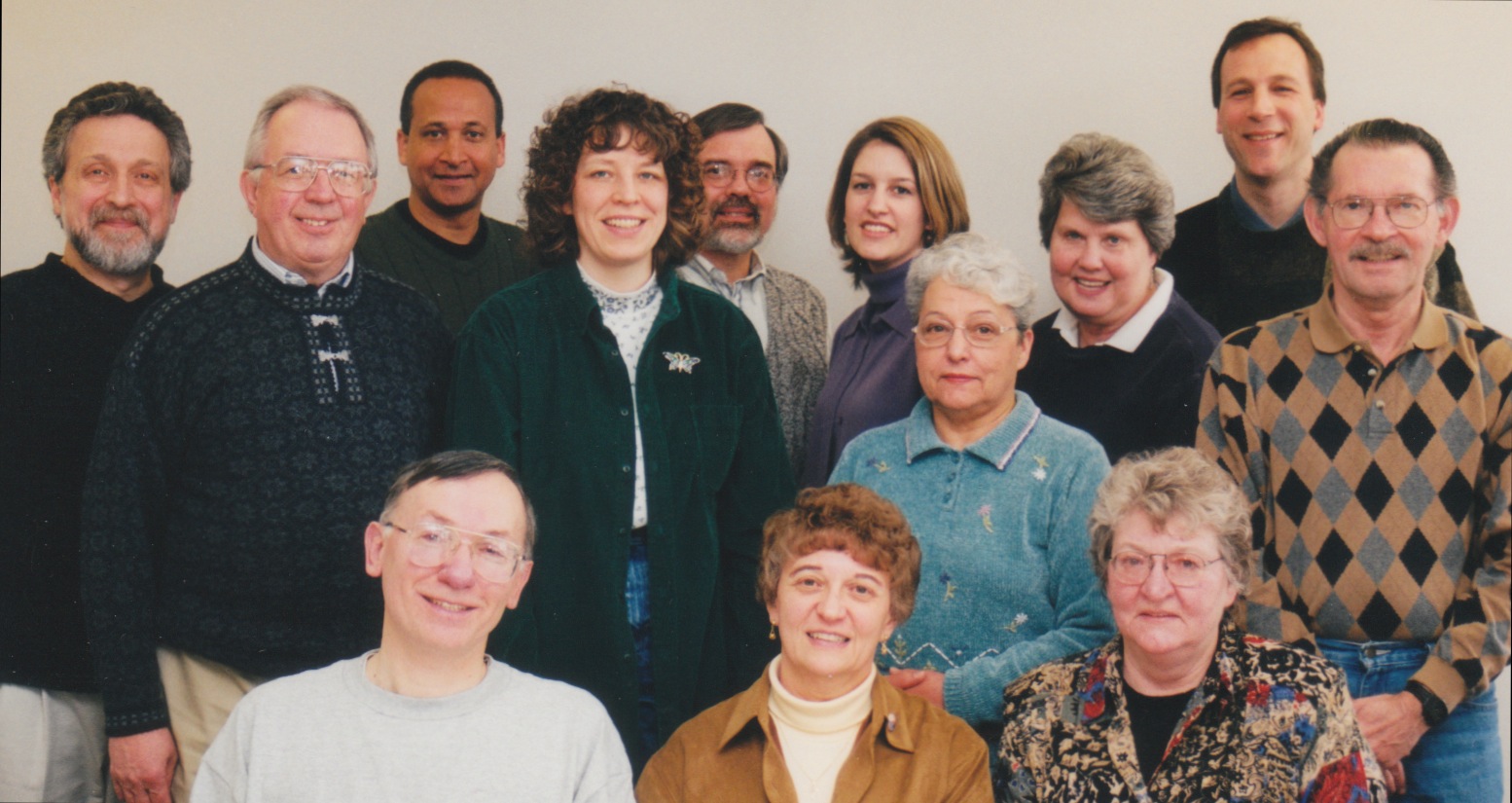
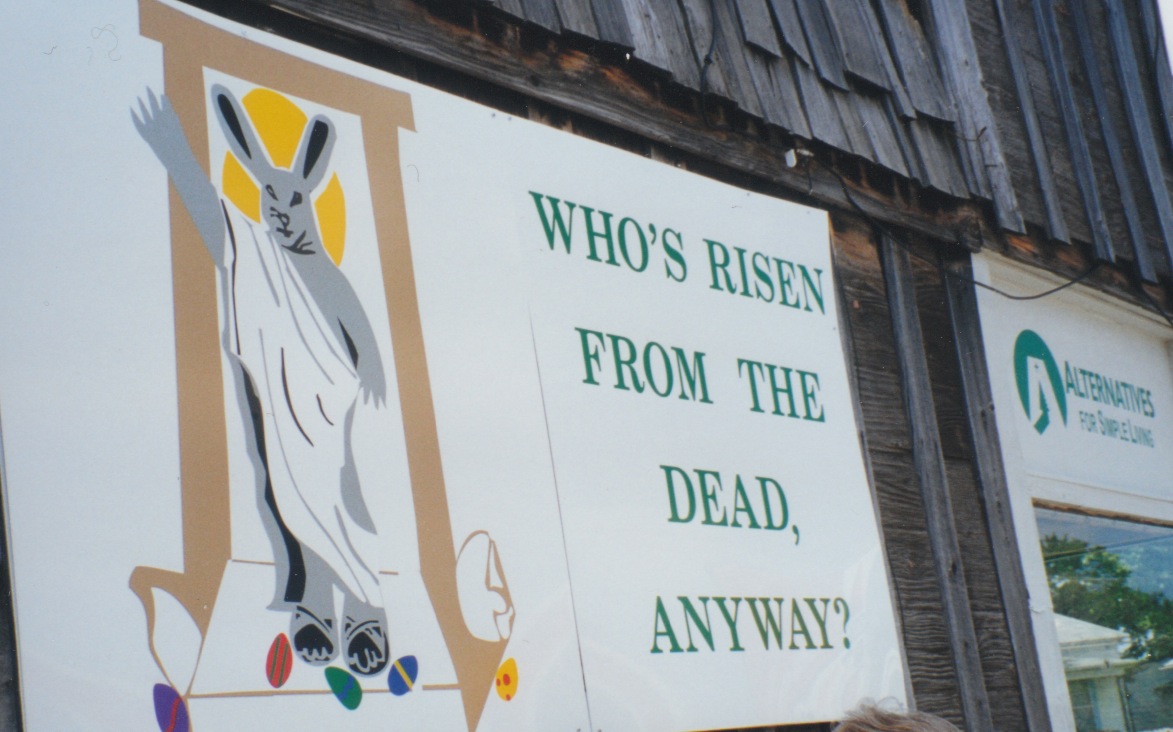
Lent & Easter resources collected into
Who's Risen from the Dead, Anyway?
- Spirit of Simplicity: Alternative Quotes & Art released as book & CD-ROM
- SLOW Down Network reaches 800 volunteers
- E-newsletter Simply 60 Seconds goes weekly
- Alternatives becomes a founding member of The Simplicity Forum
- Christmas Campaign Kit issued (annual upgrades planned)
- Simply the Best: 30 Years of Alternatives issued on CR-ROM (with annual upgrades)
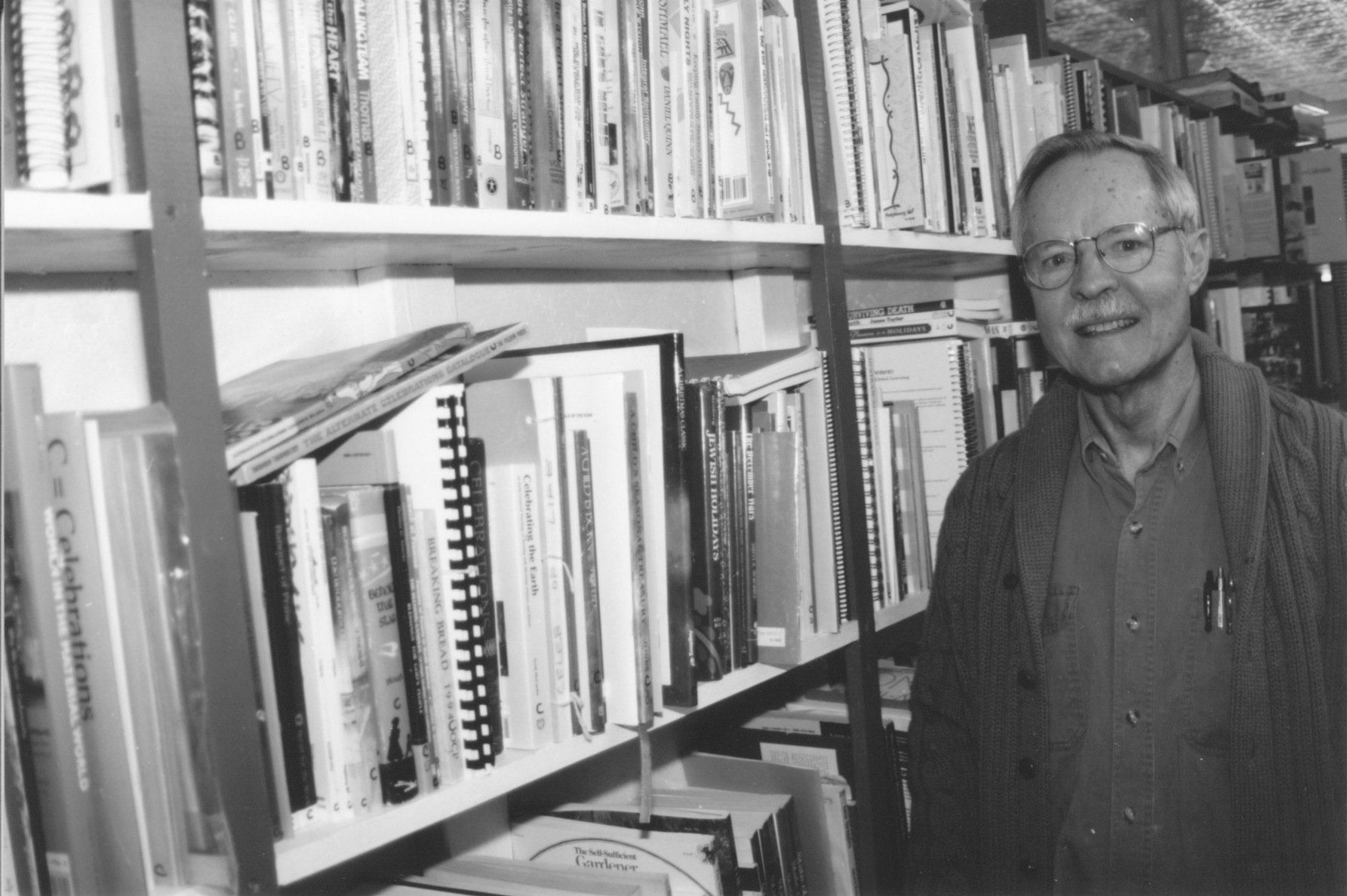
- Celebrate 30th Anniversary by announcing honorary board of directors and establishing an endowment fund
- Living Simply & Loving It! issued as Alternatives' first audio CD
- Spirit of Simplicity greeting card series issued
- Advent-Christmas Journal and audio CD issued to supplement annual Whose Birthday Is It, Anyway? booklet
- The Vision of Simpler Living: Alternatives' Video Collection issued on DVD
- Alternatives helps with The Simplicity Forum's national initiative Take-Back-Your-Time Day
- Moved The Earth Dome to Sergeant Bluff, IA. See 2003: A Dome Odyssey .

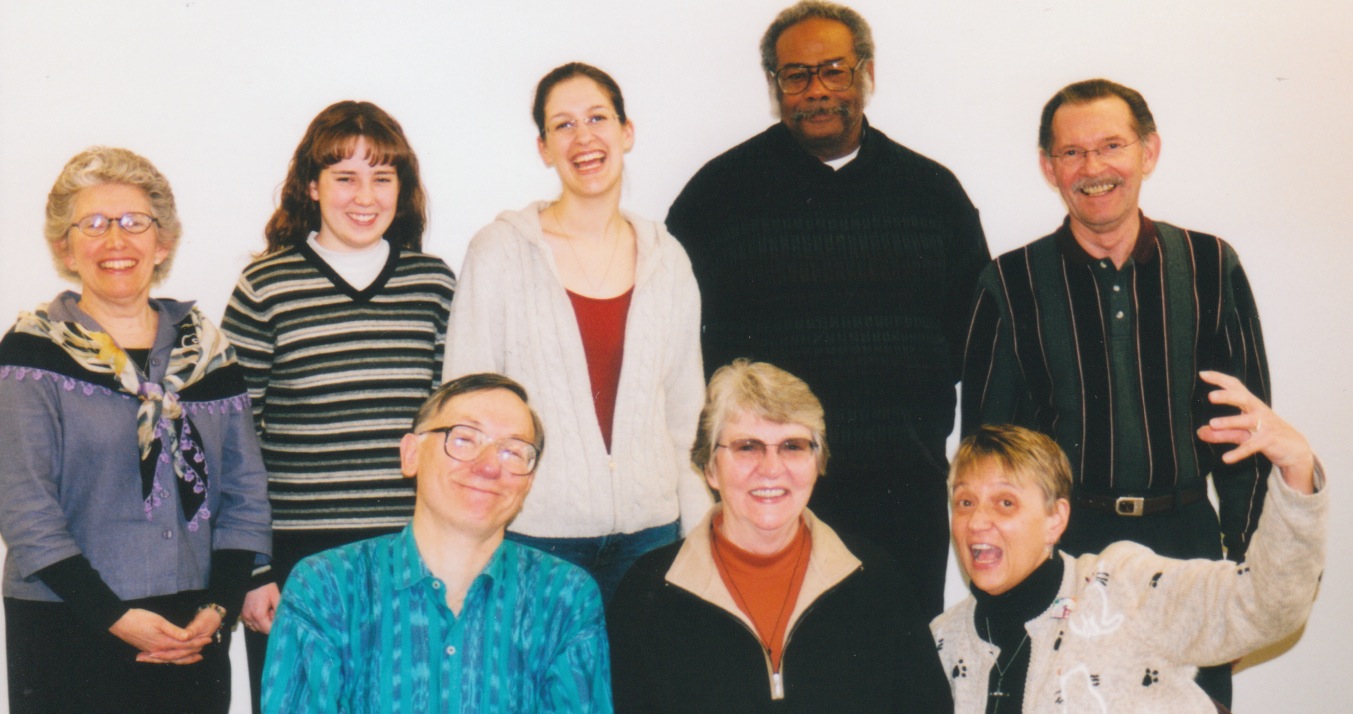
- The Anytime Game (intergenerational booklet, like The Christmas Game) issued
- Gift/newsstand version of 'Whose Birthday Is It, Anyway?' issued as 'Less Is More at Christmas'
- Radio Programs of Whose Birthday Is It, Anyway? and More-with-Less Christmas
- Carols with Justice audio CD issued
- First audio on web site: radio program demos
- Christmas CDs: Celebration Revolution of Alexander Scrooge, Have Yourself a Merry Little Christmas, Let's Get off the Christmas Roller Coaster; What Does JESUS Want for Christmas? pageant
- Moved into The Earth Dome in Sergeant Bluff, IA.
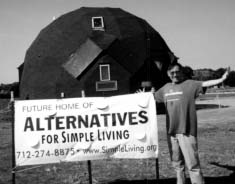 Read 'There No Place Like Dome.'
Read 'There No Place Like Dome.'
- Dome becomes an environmental demonstration project. Mascot Domey

- The Good Life curriculum for Intergenerational Vacation Bible, camps and retreats
- Nationwide goodwill tours begin: Blog/travel journal/photos; plus, more photos of staff, board and volunteers | Even more!
- YOUNG ADULT INITIATIVE launched - New young adult-friendly look for Resource Guide, web site and Whose Birthday?
- Worship Alternatives binder and CD-ROM
- Sing Justice! Do Justice! audio CD
- Expanded audio service on web site
- Simpler Living Community Network formed (incorporating SLOW Down Network)
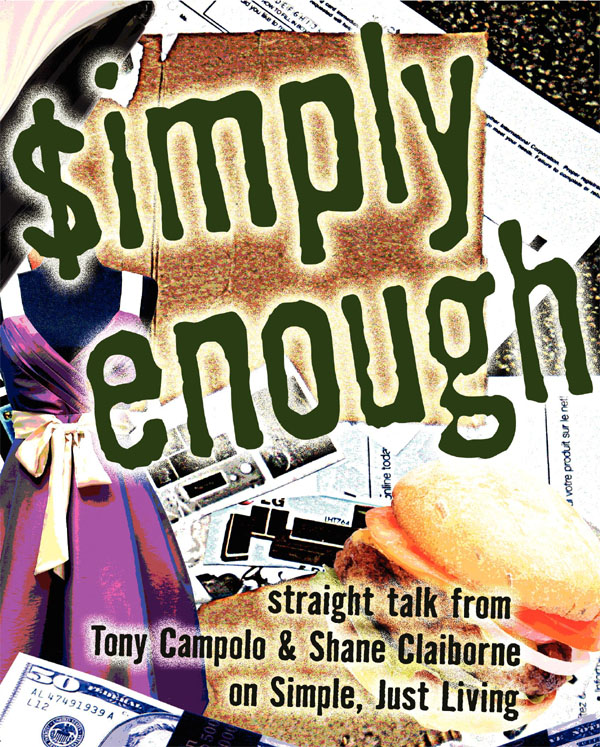
- First video service on web site
- DVD Simply Enough: Straight Talk from Tony Campolo and Shane Claiborne About Simple, Just Living
- New Co-directors move Alternatives to Colorado; Gerald Iversen retires
- Simple Choices adult board game
- Board of Directors
- Alternatives shuttered after 38 years
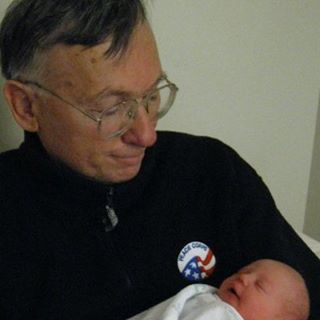
- Gerald Iversen revives the spirit of faith-based, voluntary simple living with Simple Living Works! - SLW!
- SimpleLivingWorks.org replaces SimpleLiving.org.
- New business plan: solicit and accept no cash donations, sell nothing; all resources and service are free; all-volunteer organization
- Collaborates with colleague organization Jubilee Economics Ministries (JEM) - Jubilee-Economics.org
- Simple Living videos made available for free on YouTube.
- Weekly 'Enough' blog posted for Jubilee Economics and free monthly SLW! eNews by subscription at SimpleLivingWorks@Yahoo.com
- Co-host and producer of monthly The Common Good Podcast
- Twice monthly SLW! PODCAST, including Episodes 6-11: Whose Birthday Is It, Anyway?
- 3 times weekly BLOG
- Frequent posts on Facebook, Twitter, Linked-In, Pinterest.
- Coaching service for groups via the internet.
- Archive Alternatives' resources at ELCA Archives: hard copies on paper, CD, DVD available at minimal cost.
- WHOSE BIRTHDAY? #25 published online
- Simply Enough DVD re-issued by World Vision Canada as Choose Justice with extensive new conversation guide.
- Alternatives' 40th Anniversary Year
- Kristina Kahl completes her Ph.D. dissertation on Alternatives. | Podcast Ep.52
- SLW! Recommends Literacy Service begins
- Simple Living Site and Blog Previews
- Tony Camplo and Shane Claiborne's complete 3-1/2 hour dialog released in eight podcast episodes as Tony & Shane Uncut.
- WHOSE BIRTHDAY? #26 published online; also SLW! Podcast Episodes 32-35: legacy 'WHOSE Birthday?'
- Young Adults added to Champions of Simple Living Today
- SLW! blog refined to Simple Living Works! Weekly Digest with focus on What Others Are Doing
- WHOSE BIRTHDAY? #27 published online; also SLW! Podcast Episodes 57-59: legacy 'WHOSE Birthday?'
- Our Simple Living Daily NUDGE makes brief encouragement available by Twitter and email. Nudges archived for those who want to catch up.
- Monthly and Weekly Editions of The NUDGE for those who plan ahead and want to share with others by email, Twitter, websites, etc.
- WHOSE BIRTHDAY? #28 published online; also SLW! Podcast Episodes 80-83: legacy 'WHOSE Birthday?'
- Simple Living Sanity makes brief encouragement available in the Weekly Digest. Items archived for those who want to catch up.
- Monthly and Weekly Editions of The NUDGE for those who plan ahead and want to share with others by email, Twitter, websites, etc.
- WHOSE BIRTHDAY? #29 published online; also SLW! Podcast: legacy 'WHOSE Birthday?'
- Daily and Weekly Editions of The NUDGE (blog) for those who plan ahead and want to share with others by email, Twitter, websites, etc.
- Simple Living Weekly Digest stopped. Monthly Digest, focusing on offerings of colleague organizations, updated weekly.
- WHOSE BIRTHDAY? #30 published online; also SLW! Podcast: legacy 'WHOSE Birthday?'
- SLW! Podcast consolidated with The Common Good Podcast from Jubilee OneEarth Economics.
- Regional Social Justice eNewsletters for San Luis Obispo County, CA (SLO Co.) and Sioux City, IA, area (Siouxland)
- Digest of colleague organizations
- Daily Nudges emailed to subscribers
- Daily Nudges Enhanced with complete collection of podcast episodes -- one per day
- NETWORKING - primarily online via Facebook, Skype, Google video chat
- Update and maintain SimpleLivingWorks.org
- NETWORKING - face-to-face and online
- Christmas musical
- Alternate Celebrations Catalog, 8th edition
Historical Notes
Dear Friends,
In 1973, I created Alternatives out of anger toward corporations and individuals who were prostituting society's soul by exploiting all our celebrations for profit and privilege.... At the beginning I had no staff, worked out of my home in Washington, DC and financed the first printing of The Alternate Christmas Catalogue with $2,500 contributed by friends back home in Jackson, Mississippi. I had never published anything and had no clue about how many to print. There was no marketing machine ready to expose the 59 page homemade - looking publication to the public for $1 plus three 8 - cent stamps for mailing. I was compelled by hope as Vaclav Havel, the president of the Czech Republic, defined it: Hope is an orientation of the spirit, an orientation of the heart. It is not the conviction that something will turn out well, but the certainty that something makes sense, regardless of how it turns out.... It was probably in the second year that I realized our readers were hungry for more than celebration ideas and that's when I invented the Book Service with six titles for sale.
The most memorable moments were: the Episcopal Church woman from Virginia who drove up in her Mercedes and bought catalogues for 100 friends; the envelope I opened to find a Presbyterian couple in Ohio had sent a $2,500 check from a windfall; the Oklahoma woman who won the Best Christmas Gift Contest with a homemade Christmas card from a Mississippi death row prisoner; helping the CBS Evening News with their five minute story Christmas Eve on families practicing alternative Christmas ... and two appearances on the Donahue Show. Those were heady times.
With the advantage of age and experience, I now know that every human endeavor is always merely a phase in the unfolding process of human history. The seeds we plant are more like the "seventy years to fruit" date palm than the sixty days to grow a squash.... What excites me the most about the adulthood of my dream is the commitment that so many different people breathed into the organization over 30 years to keep the vision of simpler, more compassionate lifestyles alive.
Bob Kochtitzky, Alternatives' Founder
1993
WHY CELEBRATIONS?
As a National Council of Churches staff person charged with coordinating a multi-faceted response to the world food crisis of the mid-1970s, I saw how the churches were responding with money for immediate and long-term relief. I saw how the churches were beginning to recognize and respond to the reality of hunger in this country. I saw how the churches were beginning to see the importance of influencing national policies and legislation dealing with hunger internationally and domestically. What I didn't see was any serious effort to make the lifestyle connections between affluence and poverty. I didn't see it until I saw the work Bob Kochtitzky had begun in Alternatives. From that time on, I saw lifestyle as one of the necessary components in addressing the massive problems of hunger and poverty.
First as a member of the board of Alternatives and then as director, I sensed the important role celebrations could play as learning opportunities and as occasions to begin practicing lifestyle changes. This is what I wrote in the introduction to The Alternative Celebrations Catalogue published by Pilgrim Press in 1982:
"Celebrations are the ritualized interruptions in the continuum of daily life which remind us of who we are, where we came from and where we are going. Our need and desire to celebrate are powerful drives. Celebrations should be vehicles for nurturing the human spirit. Too often they become a stable of indentured servants for commercial interests. If it were not that the drive to celebrate were so strong, celebrations would not be so attractive to exploit for profit.
"Celebrations are important points of beginning changes in the way we live because it is often in those celebrations we are reminded of the conflict between those values we hold most dear and those current in our society. Nowhere is the crass materialism of our culture and its seductive appeal more visible than in the use of religious symbols and sounds to persuade us to buy at Christmas. In the prostitution of our most sacred holidays we are able to see with greater clarity the values that really govern our society and our lives.
"If the drive to celebrate can be channeled into activities that truly nourish the human spirit, express our solidarity with all of earth's people, and respect the environment, celebrations can be a powerful means to change the ways we live generally."
I still believe that celebrations are some of our most important opportunities for learning about lifestyle connections to the larger issues we face in a consumer society.
Milo Thornberry, former Executive Director
July, 2002
When Alternatives "crashed and burned" in 1976, I was the volunteer director for a few years.
Bob Kochtitzky and I were friends from Galloway Memorial United Methodist Church in Jackson, Mississippi.
When Bob returned to Mississippi and left Alternatives, the operation moved to my church in Bloomington, Indiana.
We helped restore the organization and then Milo Thornberry became the director and it moved to Ellenwood, Georgia.
Milo continues to be a good friend to this day and he recruited us to move to Alaska when he was a leader in our denomination here. Milo is now in Bend, Oregon.
Bob was a visionary no-holds-barred pioneer and we were fortunate to be in the first wave of settlers, so to speak.
Thanks for keeping the flame alive. We will always appreciate the opportunity to be involved with the fulfilling mission of Alternatives.
We are glad to help spread the good word.
Jon B. Walters, Kenai, AK
Summer, 2003
Hymn for Gerald Iversen
Show Grace at the Table of God was 'offered with appreciate to Gerald Iversen on his 2007 Retirement as National Coordinator, Alternatives for Simple Living' by David A. Robb at his own initiative. David was winner of the hymn competition that led to the publication of Alternatives' hymn supplement Sing Justice! Do Justice!Audio/Video Stories about Alternatives by Others
Alternatives' history is well documented through stories in newspapers and magazines and in still photos. Here are some of the AV stories done by others. Gerald Iversen is the spokesperson in each case.
Page updated 2/16/22
Simple Living Works! * SimpleLivingWorks@Yahoo.com
BLOG: SimpleLivingWorks.WordPress.com
| Blog INDEX
PODCAST |
Podcast INDEX
VIDEOS
[ YouTube.com/SimpleLivingWorks ]
MISSION: Equipping people of faith to challenge consumerism, live justly and celebrate responsibly // An all volunteer educational organization.